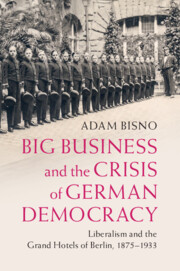Big Business and the Crisis of German Democracy
Through the colorful world of Berlin’s grand hotels, this book charts a new history of German liberalism and explores the changing relationships among big business, society, and politics. Behind imposing facades, managers and workers were often the picture of orderly and harmonious service, despite living in sometimes uncomfortable proximity. Then, during World War I, class tensions rose to the surface and failed to resolve in the following years. Doubting the ability of the Weimar Republic to contain these conflicts, a group of hotel owners, some of the most prominent Jewish industrialists and financiers in the country, chose to let Adolf Hitler use their hotel, the Kaiserhof, as his Berlin headquarters in 1932. From a splendid suite opposite the chancellery, Hitler and his henchmen engineered the assumption of power, the death of the Weimar Republic, and the ruin of their hosts, the Kaiserhof’s owners: Jewish liberals now fleeing for their lives. Big Business and the Crisis of German Democracy asks how this came about and explores the decision-making processes that produced such catastrophic consequences. This title is also available as open access on Cambridge Core.
Adam Bisno is a historian of modern Germany. This book is based on his dissertation, which won the Fritz Stern Prize from the Friends of the German Historical Institute in 2018.

